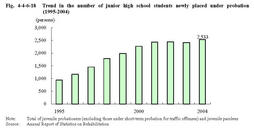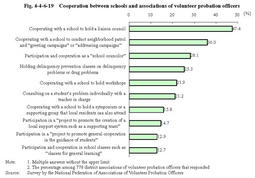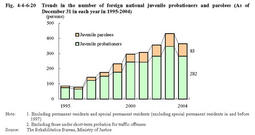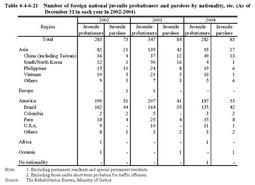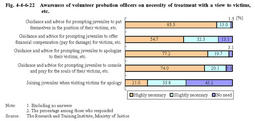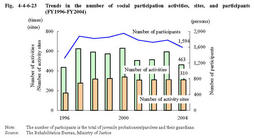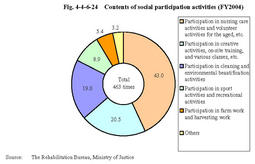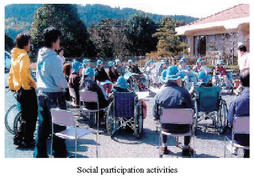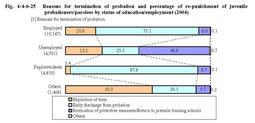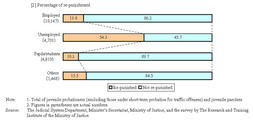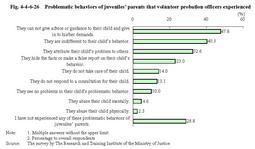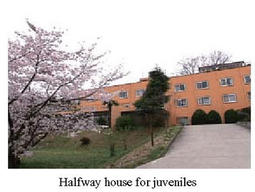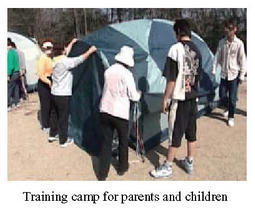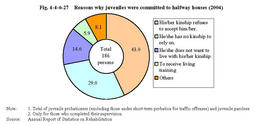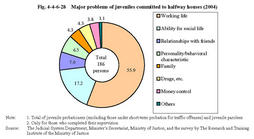| Previous Next Index Image Index Year Selection | |
|
|
4 Current conditions and issues for probationary supervision for juveniles Probationary supervision is conducted under influences from various factors and stimuli in society,and has aspects different from institution-based treatment.
First,probationers/parolees are strongly affected by family relationships and friendship.If they can get family support and good friends,it will be an incentive for them to rehabilitate and reintegrate themselves into society.However,conflict with family and bad companionship with hot rodders or gangsters in the region may lead them to take up delinquent behavior again.Family relationships and friendship are especially important for juveniles.Therefore,major issues for probationary supervision always lie in how to adjust family relationships,how to cooperate with guardians to enhance guidance for juveniles,and how to prompt juveniles to break off contact with bad friends. Second,probationers/parolees are exposed to various temptations.Those with problems related to drugs,habitual larceny,and unlicensed driving,etc.have to live in a situation where they can easily get drugs like thinners and stimulants,steal things,or drive a car if they intend to.Therefore,prompting them to resist those temptations to stop repeating delinquency is important,and persistent efforts are required to foster their normative consciousness and ability to adapt to society. Third,there is a problem of education and employment.Guidance and support during probation is usually conducted to stabilize the lives of probationers/parolees.For that purpose,the most important factors are education and employment,and cooperation with junior high schools and senior high schools and with public employment security offices and employers.Guidance and support has become more and more difficult for employment in particular,due to severe employment conditions for younger people in recent years. Fourth,probationers/parolees can move around easily.Recent development in measures of transportation and communications has expanded the range of their friendships and activities and has made it more difficult to grasp their life appropriately for implementing supervision. (1) Probationers/parolees who need special consideration in treatment As juvenile probationers/parolees who need special consideration in treatment,we will examine those that belonged to hot rodders groups,drug abusers,junior high school students,and foreign nationals.
a. Those that belonged to hotrodders groups As of December31,2004,one out of ten juvenile probationers and one out of four juvenile parolees belonged to hot rodders groups(see Fig.4-4-6-14[1] ).
Hot rodders groups not only cause significant danger and disturbance in traffic by reckless driving in groups,competitive driving,terrible noises,and gathering,but also become a nest of violence by lynching members who are going to break away or breach the order,fighting with other hot rodders groups,and violence to the general public,etc.They often have strong connections with organized crime groups as one of the sources of money and persons,and commit snatching or car theft to make money for those groups.Prompting juvenile probationers/parolees to stop reckless driving in groups and break away from hot rodders or organized crime groups is important not only as a countermeasure against organized crime but also for preventing those juveniles from committing more serious delinquency and ending up as adult offenders. Juvenile probationers/parolees that belonged to hot rodders groups are characteristically affected strongly by the group or the organized crime group behind it for their behavioral criteria or sense of right and wrong.They have extremely high interest in automobiles,and are apt to have a sense of alienation or inferiority because they are not fully accepted by their family or workplace. Among juvenile probationers/parolees newly placed under probation,those that belonged to hot rodders groups show a higher percentage than others in(i)those who are placed under probation repeatedly,and(ii)those who are connected to abuse of drugs like thinners(Source:The Judicial System Department,Minister's Secretariat,Ministry of Justice and Survey by the Research and Training Institute of the Ministry of Justice). Among juvenile probationers/parolees discharged from probation,those that belonged to hot rodders groups show a higher percentage than others in(i)those who completed the term instead of being granted early discharge,(ii)those who were punished by new dispositions by repeating delinquency/offense during probation,and(iii)those who were re-punished for Road Traffic Law violations(Source:The Judicial System Department,Minister's Secretariat,Ministry of Justice and Survey by the Research and Training Institute of the Ministry of Justice). These indicate that those that belonged to hot rodders groups not only account for a high percentage in overall juvenile probationers/parolees but also cause a lot of difficult problems in treatment. Therefore,as a premise of appropriate guidance,efforts are made to understand juveniles'living conditions concretely,including the level of their involvement in hot rodders and the conditions of their friendship and family relationships.Grasping juveniles'present conditions is very important because there are cases in which a juvenile continues to belong to hot rodders groups and participate in reckless driving in groups although he/she said that he/she had broken away from hot rodders,or a guardian can no longer control a juvenile,or takes an inappropriate attitude toward their child,such as buying a car at his/her request.In order to grasp their present conditions,probation officers regularly or intensively interview juveniles,and volunteer probation officers in charge actively visit juveniles,mutually exchange information on the same hot rodders groups,or cooperate with related organizations.Teams of probation officers sometimes visit gathering places of hot rodders groups to check whether juvenile probationers/parolees participate in the gathering. Through repeated personal interviews,they strongly urge juveniles to break away from hot rodders,prompting them to keep special conditions such as"not to have contact with hot rodders,""to follow traffic laws,""not to act violently,"or"to get employed(or go to school)and lead an orderly life".They also give guidance to guardians concerning child-rearing attitude and how to respond to juveniles. Difficulties in the treatment of those that belonged to hot rodders groups lie in the fact that there are cases where a juvenile is determined not to repeat reckless driving in groups but cannot break away from the group,fearing isolation or lynching.Therefore,cooperation with related organizations is required to recommend juveniles to find a comfortable place in sound groups such as workplace or region,or to give them guidance on countermeasures including change of abode. In some probation offices,probation officers in charge visit juveniles all together for promoting awareness before seasons when reckless driving in groups increases in number,or hot rodders cases taskforce or volunteer probation officers in charge of hot rodders cases are established to grasp juveniles'conditions or cooperate with related organizations more effectively. For the treatment of those that belonged to hot rodders groups,cooperation with related organizations and local communities is effective,with a view to cutting down connections between juveniles and organized crime groups,and dissolving or weakening hot rodders groups.It is required to further enhance the functions of probationary supervision to contribute to forming such a network. b. Drug abusers The percentage of those categorized into drug abusers has been on a declining trend(see Fig. 4-4-6-14[3] and [4] )but has remained high.
Drug abusers characteristically have bad companions concerning drugs,discord and conflict with their family,and irregular and unhealthy lives. Among juvenile probationers/parolees newly placed under probation,drug abusers show a higher percentage than others in(i)those who are placed under probation repeatedly,and(ii)those who are unemployed(Source:The Judicial System Department,Minister's Secretariat,Ministry of Justice and Survey by the Research and Training Institute of the Ministry of Justice). Among juvenile probationers/parolees discharged from probation,drug abusers show a higher percentage than others in(i)those who completed the term or received revocation of protective measures instead of being granted early discharge,(ii)those who were punished by new dispositions by repeating delinquency/offense during probation,and(iii)those who were re-punished for Poisonous and Deleterious Substances Control Law violations or Stimulants Control Law violations(Source:The Judicial System Department,Minister's Secretariat,Ministry of Justice and Survey by the Research and Training Institute of the Ministry of Justice). These indicate that drug abusers also cause a lot of difficult problems in treatment and require special consideration in probationary supervision. Therefore,efforts are made to accurately grasp the level of juveniles'drug dependence and individualized approaches are conducted by combining various methods.Probation officers get intensively involved in the initial stages,and volunteer probation officers in charge regularly visit juveniles or contact with their guardians to understand their living conditions.Guidance and advice on friendship,family relationships,life styles,and employment are also provided,and cooperation is enhanced with related organizations/groups(mental health and welfare centers/public health centers,psychiatric medical institutions,private self-help groups,etc.). Guardians'roles are significant in preventing juveniles from abusing drugs again.In many cases,guardians have had a hard time and are at a complete loss as to what to do with their child's drug abuse,but there are cases where juveniles'drug abuse is further encouraged by guardians'inappropriate attitudes,such as trying to hide the juveniles'drug abuse or giving them money as they had required.It is important to advise guardians to change their attitudes towards the juveniles while listening carefully to their worries and suffering.In probationary supervision,approaches to guardians have also been made by providing not only juveniles but their guardians with various opportunities,such as meetings to watch videos concerning the bad effects of drugs,listening to specialists'speeches on drug dependence,and writing essays of impressions,etc.Lectures and discussion meetings are also held for guardians of drug abusers detained in correctional institutions including juvenile training schools. c. Junior high school students Fig.4-4-6-18 shows the number of junior high school students newly placed under probation over the last10years.
The number increased by2.7times during the last10years.The percentage of those categorized into junior high school students increased especially among juvenile probationers(see Fig.4-4-6-14[9] ). Fig.4-4-6-18 Trend in the number of junior high school students newly placed under probation(1995-2004) Among juvenile probationers/parolees newly placed under probation,junior high school students show a higher percentage than others in(i)those who committed larceny and injury(they account for nearly70%of all those placed under probation)and(ii)those who live with their mother(the percentage of those who live with parents is low)(Source:The Judicial System Department,Minister's Secretariat,Ministry of Justice and Survey by the Research and Training Institute of the Ministry of Justice).Junior high school students are young and not a few of them commit delinquency again during probation.Classification by juvenile classification homes points out that younger juveniles are apt to be emotionally unstable due to immaturity and have difficulty in fully expressing themselves in interviews(see Section3-5(3) of this Chapter).The same applies to probationary supervision. The treatment of junior high school students also requires special consideration,but if an effective treatment is implemented at this stage with full plasticity,high level of improvement can be expected.Furthermore,close cooperation with their junior high schools is especially important. In probationary supervision,individualized and sensitive guidance and support is provided for juveniles,and at the same time,probation officers and volunteer probation officers usually maintain close coordination with the related parties of their junior high schools. For effective coordination in individualized treatment,volunteer probation officers,whose activities are rooted in local communities,are required to regularly make chances for interaction with local junior high schools to maintain cooperative relations.Their expertise and experience can also be utilized for delinquency prevention activities and other activities to prevent various problems of junior high school students.Many associations of volunteer probation officers have made such efforts as assigning volunteer probation officers in charge of schools,holding delinquency prevention classes,participating in support teams to support juveniles'rehabilitation in cooperation with related organizations,and having joint workshops with teachers in charge of the guidance of students. Fig.4-4-6-19 shows cooperation between schools and associations of volunteer probation officers,according to the results of the survey of905district associations of volunteer probation officers nationwide conducted by the National Federation of Associations of Volunteer Probation Officers(responses:778;response rate:86.0%). Fig.4-4-6-19 Cooperation between schools and associations of volunteer probation officers d. Foreign nationals Fig.4-4-6-20 shows the number of foreign national juvenile probationers and parolees over the last10years,as of December31in each year.
Fig.4-4-6-20 Trends in the number of foreign national juvenile probationers and parolees(As of December31in each year in1995-2004) Table4-4-6-21 shows the number of foreign national juvenile probationers and parolees over the last three years by nationality,etc.,as of December31in each year.As of December31,2004,the number of nationalities,etc.was17(including those stateless),among which Brazilians were the largest in number for both probationers and parolees(177juveniles in total),followed by Chinese(62juveniles including Taiwanese)and Peruvians(43juveniles). Foreign juvenile delinquents(i)often have difficulties in communication due to poor Japanese language skills,(ii)relatively have trouble obtaining jobs,and(iii)have only limited human relationships,making it difficult for them to receive various social supports.Furthermore,their guardians often lack in sufficient Japanese language skills,too.All these facts make probationary supervision and environmental adjustment for those foreign national juveniles even more difficult. For smooth initiation of probation,the Ministry of Justice prepares pamphlets to explain probationary supervision in English,Chinese,Korean,Spanish,Portuguese,Tagalog,and Vietnamese.Probation offices that receive many foreign juvenile delinquents try to enhance treatment by preparing related documents in foreign languages,securing interpreters,and cooperating with related organizations and groups. Some foreign juvenile delinquents are allowed to stay in Japan legally,but others are to be deported.Examination is required for the latter from a wider point of view,including how their treatment should be implemented. Table4-4-6-21 Number of foreign national juvenile probationers and parolees by nationality,etc.(As of December31in each year in2002-2004) (2) Enhancement of treatment with a view to victims,etc. In probationary supervision,treatment with a view to victims and their bereaved families(hereinafter referred to as"victims,etc."in this Section)has been implemented on a case-by-case basis.However,in recent years,protection of victims,etc.has come to be emphasized in overall criminal policies and the treatment with consideration to victims,etc.is required more seriously than before,taking into account recent changes in juveniles'attributes.
The survey on volunteer probation officers'activities and attitudes,which was conducted by the Research and Training Institute of the Ministry of Justice in2004(questionnaire survey of3,000volunteer probation officers(response rate75.3%);hereinafter referred to as"Special Survey of Volunteer Probation Officers"in this Section),asked about the necessity of the treatment with a view to victims,etc.As is seen in Fig.4-4-6-22 ,volunteer probation officers answered it highly necessary to provide"guidance and advice for prompting juveniles to put themselves in the position of their victims,etc.,""guidance and advice for prompting juveniles to apologize to their victims,etc.,"and"guidance and advice for prompting juveniles to console and pray for the souls of their victims,etc." In the"Survey of Juvenile Training School Instructors,"what was considered as the most serious problem in recent juveniles'attributes was the fact that"they lack in sympathy toward others and the ability to understand or imagine other people's pain"(see Chapter3,Section2-2 of this Part).Volunteer probation officers also seem to recognize such tendency while having contact with juveniles,and feel it necessary to prompt them to put themselves in the position of their victims,etc.and offer apologies. Probationary supervision aims to prompt juvenile probationers/parolees to understand the pains of their victims,etc.and provide guidance to make them aware of a sense of guilt.In some cases,probation officers or volunteer probation officers join juveniles to go and offer apologies for victims,etc.,and give support for encouraging voluntary apologies and compensation.Such efforts should be further emphasized in the treatment in the future,along with encouraging juveniles'rehabilitation. Fig.4-4-6-22 Awareness of volunteer probation officers on necessity of treatment with a view to victims,etc. (3) Enhancement of social participation activities In probationary supervision,juvenile probationers/parolees are encouraged to participate in nursing care and volunteer work at welfare facilities,environment beautification activities such as park cleaning,etc.,on-site training such as pottery classes and cooking classes,farm work,sport activities,and recreational activities,etc.in order to foster a social nature in juveniles and enhance their capacity for adaptability to society.Such social participation activities were first started as one of the methods to implement short-term supervision,and then came to be applied widely to all juvenile probationers/parolees.
Fig.4-4-6-23 shows the number of social participation activities,sites,and participants(including guardians)since FY1996. In FY2004,social participation activities were implemented463times,at310sites with the participation of1,594persons(including177guardians). Fig.4-4-6-24 shows the contents of activities in FY2004. Fig.4-4-6-23 Trends in the number of social participation activities,sites,and participants(FY1996-FY2004) Fig.4-4-6-24 Contents of social participation activities(FY2004) Participants have various impressions,such as"I felt embarrassed but happy when elderly persons thanked me,""I felt that I could be of help to others,""I didn't know that I could be so engrossed in farm work,""I felt good to get up early and work for the first time in years."These activities seem to encourage juvenile probationers/parolees to reflect on their own life style,have sympathy towards other people,and build a positive self-image.Social participation activities are one of the effective treatment measures to foster sympathy among juveniles and enhance their ability to adapt to society through various real-life experiences.Changes in the number of social participation activities are shown in Fig.4-4-6-23 ,and it is an important challenge for probation/parole supervision to further make these activities diversified and significant.Probation/parole offices have tried to expand activity sites and enhance activity contents with cooperation from rehabilitation related associations,such as the volunteer probation officers association,BBS associations,and the Women's Association for Rehabilitation Aid,etc. Social participation activities (4) Enhancement of guidance and support for employment Guidance and support for employment is very important in probationary supervision.Juvenile probationers/parolees can come to acquire a regular life style,financial stability,wider social perspective,and self-confidence through working.The interview survey conducted prior to the"Special Survey of Volunteer Probation Officers"(the survey conducted for82volunteer probation officers in18prefectures between February and March of2004)asked when they felt that a juvenile probationer/parolee successfully rehabilitated himself/herself.Many of those volunteer probation officers considered continuation of employment as an important indication of rehabilitation,answering that it was"when he/she can keep the job and comes to acquire a regular life style"or"when he/she can become established in his/her workplace".
Fig.4-4-6-25[1] shows reasons for termination of probation of juvenile probationers/parolees in2004,by status of education and employment.The percentage of those who concluded their supervision by revocation of protective measures was extremely high for unemployed juveniles. Fig.4-4-6-25[2] shows the percentage of re-punishment of juvenile probationers/parolees in2004,by status of education and employment.The percentage of those who were re-punished for repeating delinquency or offenses during probationary supervision was extremely high for unemployed juveniles. In order to prevent them from committing repeat delinquency or offense and to promote their rehabilitation,further enhancement of guidance and support for employment is indispensable. Fig.4-4-6-25 Reasons for termination of probation and percentage of re-punishment of juvenile probationers/parolees by status of education/employment(2004) Many of those unemployed juvenile probationers/parolees spend life idly,playing around at night with their peers who are also jobless,and cannot find a real job or even do not know how to find one.During probationary supervision,persistent guidance and advice is provided for those juvenile probationers/parolees by encouraging them to change their life and relationships with their friends and consulting them on their employment.It will become more and more important to enhance various policies such as increasing the number of cooperative employers who actively hire juvenile delinquents,and promoting coalition with relevant organizations such as public employment security offices. (5) Approaches to guardians In the"Survey of Juvenile Training School Instructors,"more than80%of instructors answered that"guardians lacking in ability for leadership increased,"pointing out problems concretely,such as"they lack in a sense of responsibility toward their child's behavior,""they spoil their child by giving in to his/her demands,"and"they are indifferent to their child's behavior"(see Chapter3,Section2-3 of this Part).
Fig.4-4-6-26 shows the answers to a question on"problematic behaviors of juveniles'parents that volunteer probation officers experienced"in the"Special Survey of Volunteer Probation Officers". Fig.4-4-6-26 Problematic behaviors of juveniles'parents that volunteer probation officers experienced In order to achieve effective probationary supervision for juveniles,cooperation with guardians is indispensable.Probation offices have taken approaches personally to individual guardians,and have provided group work and group lectures for guardians who have trouble handling their child.However,those guardians lacking in ability for supervising their child are apt to avoid cooperating with probation officers and volunteer probation officers.Therefore,it is an important issue for the future to make such guardians aware of their responsibility for the custody of their child through enhancing effective approaches.(6) Strengthening of volunteer probation officers'ability for treatment In order to further enhance probationary supervision,it is especially important to strengthen the ability for treatment of volunteer probation officers,who directly have contact with juvenile probationers/parolees.
As of January1,2005,volunteer probation officers were63.0years old on average(Source:The Rehabilitation Bureau,Ministry of Justice),while juveniles newly placed under probationary supervision were17.2years old in2004on average(Source:The Judicial System Department,Minister's Secretariat,Ministry of Justice).The gap was nearly46.Through acquiring experience,volunteer probation officers can deepen their knowledge and skills,but the gap in age might affect their communication with juvenile probationers/parolees. Furthermore,23.0%of volunteer probation officers were70years old or over(as of January1,2005;Source:The Rehabilitation Bureau,Ministry of Justice),and many officers are going to be retiring(reappointment is allowed to those under76years of age,and the term lasts two years after reappointment)every year from now.As a result,volunteer probation officers with little or no experience might increase in number. Therefore,enhancement of guidance and training by probation officers has become more and more important to maintain and strengthen volunteer probation officers'ability for treatment. At probation offices,probation officers give guidance and advice personally to volunteer probation officers through cases of which they are in charge.In addition to this,training for newly-appointed volunteer probation officers and regular training by region are also implemented.In FY2004,various themes were taken up,such as"interview skills,""cooperation with related organizations including schools,""how to respond in a critical situation,""how to relate to juveniles'families,""guidance on tasks during short-term probation,""treatment of abusers of thinners,etc.,"and"treatment of hot rodders",etc.(Source;The Rehabilitation Bureau,Ministry of Justice).Through such training,volunteer probation officers acquire knowledge and skills necessary for probationary supervision systematically and continuously. However,to the question"what is important as a policy for volunteer probation officers?"in the"Special Survey of Volunteer Probation Officers,"the most common answer was"enhancement of treatment guidance by probation officers"with98.0%,followed by"enhancement of training"with96.4%,and"enhancement of consultation and information exchange on treatment among volunteer probation officers"with94.8%.This indicates that volunteer probation officers strongly hope for further improvement of their ability for treatment. Taking such needs into consideration,it is necessary to further enhance treatment guidance by probation officers and training for volunteer probation officers in the future. (7) Strengthening of ability for treatment at halfway houses As of April1,2005,out of101halfway houses nationwide(see Part2,Chapter5,Section4-2 ),five institutions accommodate only juveniles,and76institutions accommodate juveniles along with adults(Source:The Rehabilitation Bureau,Ministry of Justice).
In2004,there were81juvenile probationers and227juvenile parolees newly committed to halfway houses(Source:Annual Report of Statistics on Rehabilitation). Halfway house for juveniles Training camp for parents and children Fig.4-4-6-27 shows reasons why juveniles who concluded their supervision were committed to halfway houses in2004.The figure shows that many of them have a poor protective environment.Fig.4-4-6-28 shows major problems pointed out for juveniles who concluded their supervision and were committed to halfway houses in2004.Important themes are how to secure a job while they are in halfway houses,how to train them to acquire working habits,and how to prompt them to learn social skills. Fig.4-4-6-27 Reasons why juveniles were committed to halfway houses(2004) Fig.4-4-6-28 Major problems of juveniles committed to halfway houses(2004) At halfway houses for juveniles,various kinds of distinctive treatments are implemented,such as working experience activities at an attached automobiles maintenance factory,a training camp for parents and children to restore parent-child relationships,and classes on personal computers,etc.Each house has only3.8full-time officers on average(as of April1,2005;Source:The Rehabilitation Bureau,Ministry of Justice),who have been putting their efforts into guidance and support for juveniles who are often hard to handle.In addition to diversifying and enhancing treatment programs,it is required to strengthen the ability for treatment totally through improving the treatment systems and cooperating with local communities,etc. |
